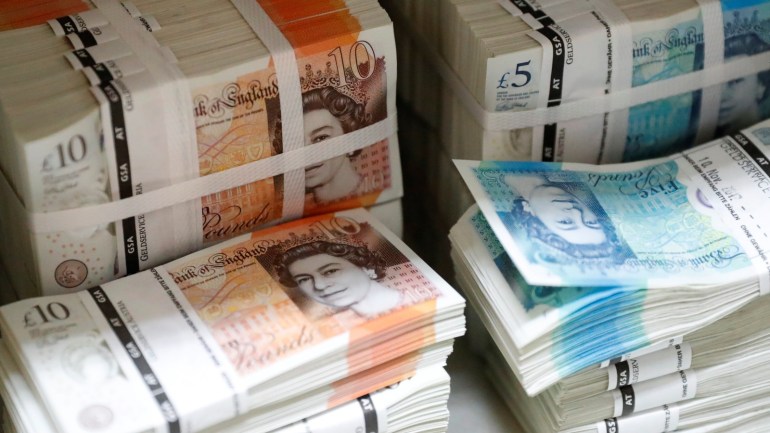The Federation of British Businesses warned Monday that the re-imposition of a general lockdown in Britain - which could plunge the country again into recession - represents a "devastating" threat to the British economy, which has been badly damaged by Covid-19.
The Federation's General Director, Caroline Verbierne, who is preparing to leave her post, delivered a disturbing speech at the opening of the annual conference of the Confederation of Business held online this year a few days before the start of the implementation of a new lockdown in the country Thursday, with the aim of stopping the rapid spread of the virus.
Fairbairn expressed her regret at the absence of conservative Prime Minister Boris Johnson - whose relations with the business world are strained - from the conference after he apologized for attending at the last minute, given that he was scheduled to speak during the day in front of Parliament, and Johnson represented the minister in charge of communication with companies Alok Sharma .
Fairbairn said, "It is a pity that the prime minister has not joined us, we hope we can hear him" before the end of the 3-day conference.
Her successor, Tony Dunker, should make rebuilding trust with the government a priority, after years of tension over Brexit.
Criticism
During the conference, the leader of the opposition Labor Party, Keir Starmer, criticized the government's handling of the health crisis, stressing that he stood by the companies.
"They did not learn, they did not listen, they did not lead, the result is tragic, but it is very expected," Starmer said, accusing the government of being too late to take measures to contain the virus.
The Confederation said the companies were "better prepared" for the new closure.
Fairbairn stressed that "it is essential to keep the economy as open as possible."
In the context, the Labor Party tweeted on Twitter: The Parliament will debate on Tuesday economic support from the government for companies and individuals.
The party’s parliamentary team said the party’s fiscal policy chief would use a discussion on an “urgent issue” to ask Finance Minister Rishi Sunak to make a statement on “the economic support available to individuals and companies during and after the recently announced lockdown.”
Britain's GDP is expected to drop between 6 and 10% in November (Reuters)
nightmare
The new restrictions come at the worst of times, especially for distribution companies;
The last two months of the year are traditionally the busiest with "Black Friday" and then Christmas.
The British Retailers Union spoke of a "pre-Christmas nightmare".
"This will cause untold damage to shops in city centers, to jobs, and to delay the recovery of the economy, with little impact on the transmission of the virus," said its general manager, Helen Dickinson.
In the face of this new shock to the economy, the government decided immediately to partially extend the unemployment compensation mechanism for one month, until the end of this month, under which the state pays most of the wages of workers without work.
But Fairbairn is calling for "more clarity on the schedule", fearing a new wave of job cuts once the mechanism is withdrawn.
Relationship with Europe
All eyes are now on the Bank of England, which is due to unveil the results of Thursday's monetary policy meeting.
The monetary institution can strengthen its asset buy-back program in order to support the economy and reassure markets, while still thinking about implementing negative interest rates.
The pandemic will not be the only topic on the list of discussions at the conference of business owners, who are concerned about the slowdown in discussions between London and Brussels over the relationship after "Brexit".
Fairbairn again called for speeding up the conclusion of an agreement with the European Union, and said "We urgently need it" in order to avoid a double shock to the economy.
The British economy is likely to experience a very difficult end this year, with reduced economic activity this month due to containment measures, leading to a setback in the fourth quarter after a rebound in the summer.
Deutsche Bank economists point out that "the consequences for growth will be significant".
We expect a decrease in the gross domestic product of between 6 and 10% this month, and a "likely" contraction during the last quarter.
Meanwhile, a survey reported that British factories lost more momentum last October, especially the manufacturer of consumer goods, which strengthens indications of a slowdown in the economy, at a time when the number of Coronavirus infections escalates.
Nevertheless, an indicator of the extent of optimism for the coming year has reached its highest level in 3 years.
The IHS Markit / CIBS Purchasing Managers' Index in the manufacturing sector fell to 53.7 points, compared to 54.1 points last September.
But it remains slightly above the initial reading, and above the 50 threshold that indicates growth.
Intermediate and investment goods industries recorded a strong performance last October, but companies producing consumer goods - which are most sensitive to economic changes in the short term - witnessed a decline in production and new activities, for the first time since the recovery from the Covid-19 shock began earlier. This year.
More than 60% of the companies expected to increase production over the next year, compared to 10% that expected the decline.

